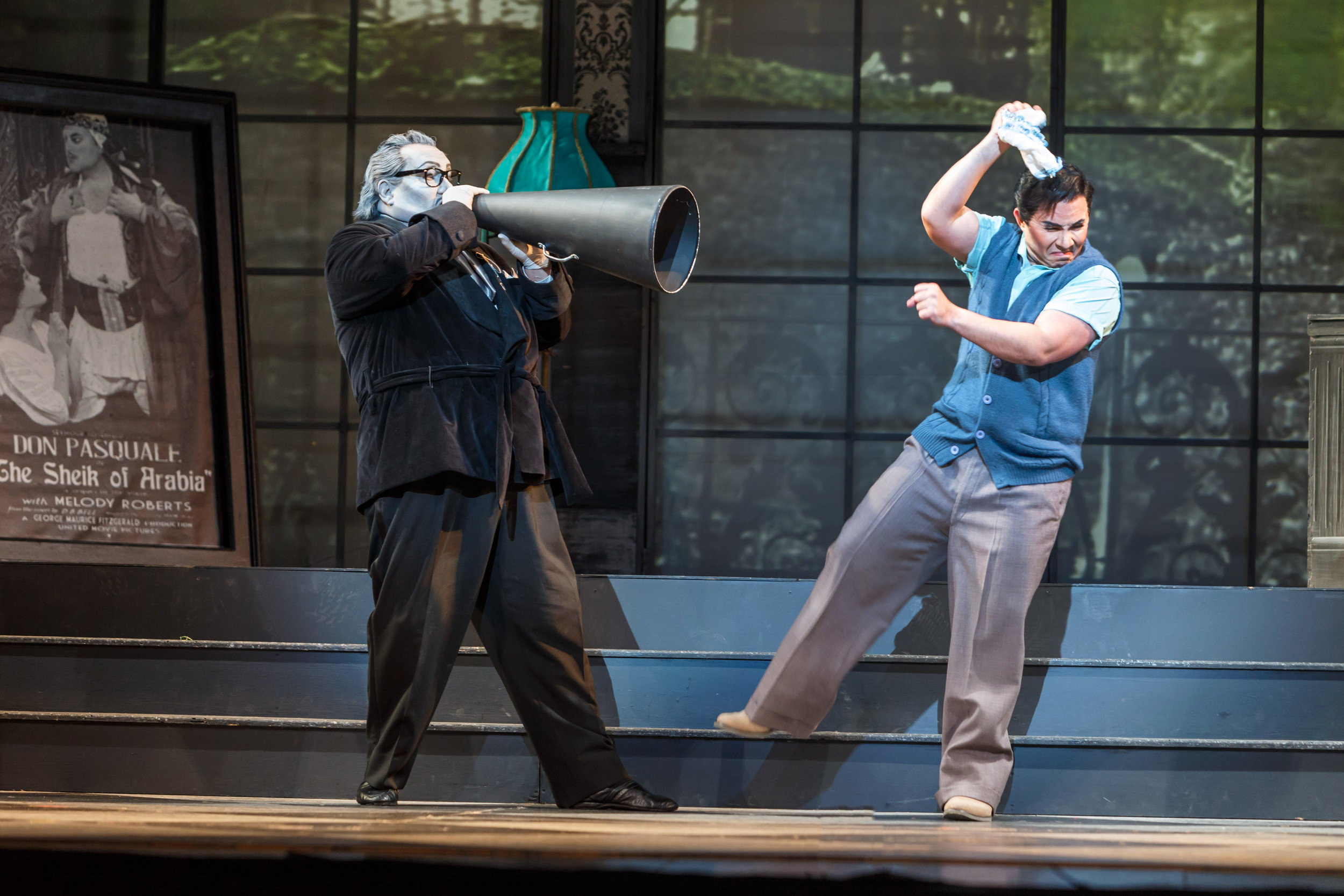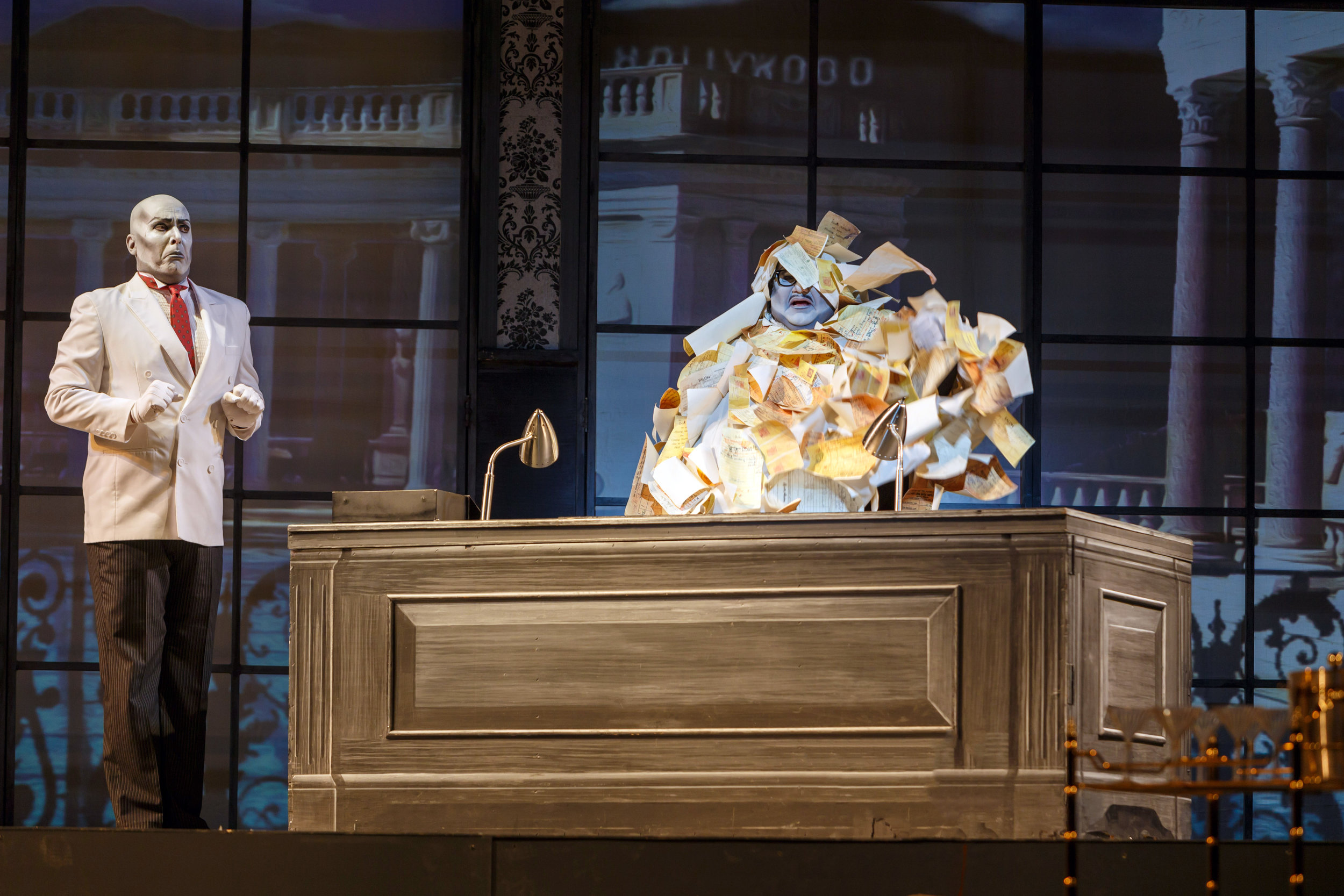How do you brew a great opera experience? Mixing Donizetti and Oropesa is a great start. Operas are not a one-person show, ever. They are the result of many talented, dedicated contributors. So, I feel guilty raving about one team member in particular, but I am going to rave about Lisette Oropesa, right now, right up front for everybody to see. She is already a veteran of the Metropolitan Opera and has spent the last couple of years perfecting her craft working in Europe. I previously saw her perform live in 2016 at the Kennedy Center and was impressed. She recently won the Richard Tucker Award, the top opera award. When she appeared for the first time Saturday night in Pittsburgh Opera’s Don Pasquale, the impact was even greater than the change from black/white scenery to color suggested; like a light bulb, the life in the performance came on, Donizetti meets star power. There were other excellent performances and other important good stuff to talk about, but let’s get the ‘why you must not miss this performance’ out of the way up front. Pittsburgh, go see and hear Lisette Oropesa while you can.
Javier Abreu as Ernesto, Lisette Oropesa as Norina, Kevin Glavin as Pasquale, and Joshua Hopkins as Dr. Malatesta. Photo by David Bachman Photography; courtesy of Pittsburgh Opera.
Now, I return you to your regularly scheduled blog report. In a relatively short life, composer Gaetano Donizetti (1797-1848) wrote about sixty operas that include several firmly seated in the currently produced repertoire, including Lucia di Lammermoor, The Elixir of Love, The Girl in Algiers, the Tudor Queen triology. He is famous for how little time he needed to compose his operas; the estimates for his comedy Don Pasquale (1842) are between 11 days to three weeks according to Pittsburgh Opera’s Kristin Gatch who gave the pre-opera talk; I assume that was the amount of time after librettist Giovanni Ruffini had provided the script, although Donizetti made so many changes that Ruffini refused to have his name published with it. It appears the main driving force for Donizetti was not producing masterpieces. He was turning out entertaining bel canto operas to meet the demands of an adoring public. He wanted his operas to be entertaining. He, along with Rossini and Bellini, were the masters of the bel canto style of opera, and the music in Don Pasquale is masterful and melodic, perhaps his best; in fact listening to some recordings just for the music is now on my to-do list. Kudos to Conductor Garry Thor Wedow and the Pittsburgh Opera Orchestra for bringing it so fully to life. Yes, the arias were delicious, but the music is worth a listen all on its own. The excellent chorus which only gets to shine near the end of the opera also deserves high entertainment marks.
Top: Pasquale (Kevin Glavin) uses a movie director’s megaphone to make his point to Ernesto (Javier Abreu). Bottom: Majordomo Max (Ian Christiansen) stands by Pasquale (Kevin Glavin) buried in bills run up by his new bride. Photos by David Bachman Photography; courtesy of Pittsburgh Opera.
This version of Don Pasquale must be associated with its Director’s name, Chuck Hudson. It is distinctively his as well as Donizetti’s and Ruffini’s. This production is updated to the fifties Hollywood. Don Pasquale is a has-been, but still wealthy, movie star from the silent film era. He is upset that his nephew, Ernesto, is unwilling to marry the woman of Pasquale’s choice, even with the offer of an allowance and sole inheritance rights to Pasquale’s fortune. Instead, Ernesto insists he will marry a poor widow named Norina for love. A frustrated Pasquale strikes back by throwing his nephew out and announcing his intention to marry and create a new heir. He calls on his friend Dr. Malatesta to help him find a bride. Malatesta sets up a scheme whereby Pasquale marries Norina thinking she is Malatesta’s meek sister. Norina is beautiful and acts docile, and soon Pasquale is all in. After a fake wedding ceremony, she becomes the shrew from hell, and Pasquale soon wants out. All ends well with Pasquale reinstating Ernesto and agreeing to his marriage to Norina to rid himself of her, graciously accepting the lesson he has learned.
Dr. Malatesta (Joshua Hopkins) and Norina (Lisette Oropesa) firm up their scheme. Photo by David Bachman Photography; courtesy of Pittsburgh Opera.
Director Hudson’s staging includes added physical humor, sight gags, and amusing early-style Hollywood-film clips. The first film clip is shown while Donizetti’s excellent overture plays, a slight disconnect to the opera, but a genuinely funny addition. Additional clips shown at the beginning of each subsequent act or scene; the later ones are accompanied by piano music. According to PO’s Head of Music, Glenn Lewis, “The piano music used as film underscores are adaptations of instrumental pieces by the same composer, Donizetti, as the opera. The first excerpt, for example, is adapted from a Flute sonata. (This) instrumental music is seldom if ever performed.” It fits very well with the old-time film clips. The classical production of the opera is amusing, but Mr. Hudson’s is laugh-out-loud funny in quite a few places. The secondary players were used to great comedic effect – bass-baritone Tyler Zimmerman in a singing role as the notary, Ian Christiansen as Max, Kristy Dalbo as the maid, Mary Catherine Malek as the cook, and JR Graff as houseboy. How Director Hudson managed to have all these comedic players and effects and still keep pace with the score, I do not know, but it works, and it makes for a very entertaining evening.
One of the best moments in the performance was one that I was worried about prior to attending, the scene where Norina slaps Pasquale. It gave the production a touch of pathos that bolsters good comedy and does so without making Pasquale too sympathetic, which would not be funny. Ms. Oropesa manages such a contrite face after the slap, which Norina felt was necessary to bring Pasquale around, that I felt sympathy for both characters. Nicely done. Comedy is tricky to pull off, and this team managed it well.
The supernumerary chorus as A-listers at the party at Pasquale’s house. Photo by David Bachman Photography; courtesy of Pittsburgh Opera.
I said there were other excellent performances and indeed there were. Another reason to see this Don Pasquale is to see and hear baritone Joshua Hopkins. His strong baritone voice, which can be authoritative or caressing, was put to good use as Dr. Malatesta which he played with camp and flair. I saw him previously opposite Ms. Oropesa in Washington National Opera’s The Marriage of Figaro mentioned earlier and recently in WNO’s Faust. In Figaro, I reported that his voice seemed under-powered; in Faust I remarked on how surprised I was at how powerful his voice is. Go figure. I had no concerns Saturday night. He is clearly a rising star I would love to hear again. This performance was anchored by veteran basso buffo Kevin Glavin who was a perfect Hollywood Pasquale, singing with power and clarity, and acting the role of Pasquale with comedic flair, frustration, anger, or making himself a sympathetic figure as required. The squirrely role of Ernesto offers little chance to stand out; it focuses the audience on the tenor’s voice and singing and comic runnings about. I was looking forward to seeing tenor Javier Abreu in the role, but for the most part he did not distinguish himself. He sang too light for this role, though with a lovely display of emotion; he was often over-powered by the orchestra. He shone better in Act III when his duet with Ms. Oropesa was quite beautiful. He scampered about as a young boy for comedic effect, but it added to the opera’s disconnect for me – what in the world does this savvy, powerful Norina see in Ernesto? I can only conclude he must be good in bed. Perhaps Mr. Hudson should add a hint of that. One additional comment about Ms. Oropesa. This is now the polished Lisette Oropesa, in her prime. Her voice has truly impressive clarity, pitch perfection, flexibility, and a very pleasing timbre! My wife said to me during the performance, “The girl is good.” Yeah, the girl is good!
In truth, I started watching the performance with some concerns whether the comedy would be funny and whether I would like what Pittsburgh Opera had done to a Donizetti classic with updated trappings, but also in truth, I must admit that I left with a happy smile on my face, only regretting that I could not remain in Pittsburgh to see Ms. Oropesa in another performance. There is so much packed into this production, it might be even funnier the second time.
The Fan Experience: Don Pasquale has only three more performances - April 30, May 3, and May 5 - but tickets are available in all price ranges. I also recommend the informative pre-opera talk by Kristin Gatch, Assistant to the General Director/Board Liaison for Pittsburgh Opera, given in the opera house one hour prior to the performance.
Author’s Soapbox and a Spoiler Alert – I’m about to reveal a surprise in the opera. Not having seen Don Pasquale before, I was caught completely off guard by the follow-on to the patter duet in the last act as Maletesta and Pasquale sing of how to deal with Norina’s secret meeting with a paramour (Ernesto); in patter song, the singers sing very fast, sort of like an auctioneer making a quick sale; it is an amusing feat. This redux is part of the opera, though it is handled differently in this version. The supertitle screen read “Would you like an encore?” as they finished the scene. The audience roared its approval and one was provided; it was great fun! I think opera folks should consider the lesson here, which I think is that audiences want to be connected to performances, perhaps like they used to be for opera when the stories were new and going to the opera was a social event, when rowdy audience members might shout to a singer and encores were not all that unusual. Just a thought. This Don Pasquale provided that connection through its updating, modern comedy effects, and that engaging encore. It’s not your father’s Don Pasquale, but then, you are not your father.
Once more, my wife and I had a great visit to Pittsburgh for opera – Hotel Monaco (my wife got us a free night with points), dinner from Nicky’s Thai, and Sunday brunch at Union Standard, and miracle upon miracle, no traffic jams on the Pennsylvania Turnpike – well, one brief slowdown due to fog on the way home. Great city, great opera company!





